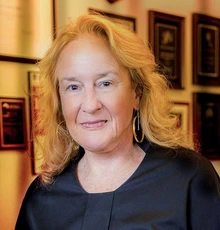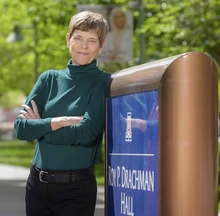Precision Aging Network data release opens new pathways for healthy aging research

A database created by the University of Arizona-led Precision Aging Network will help researchers pinpoint factors that lead to helping people living longer, healthier lives.
Photo by Thomas Barwick via Getty Images
Story updated Nov. 24
The University of Arizona-led Precision Aging Network, a national, collaborative effort to transform the field of cognitive decline, genomics and healthy aging research, has released its first comprehensive dataset on normal cognitive aging.

Carol Barnes, Regents Professor of psychology in the College of Science, leads the Precision Aging Network.
Photo courtesy of Carol Barnes
The 300-terabyte release makes the first four years of the Precision Aging Network's research findings publicly available to scientists nationwide through the National Institute on Aging's repository. A researcher portal and website launched simultaneously for global access.
The Precision Aging Network, funded by a $60 million grant from the NIA, a division of the National Institutes of Health, is mapping, measuring and ultimately helping to understand how the healthy brain ages, which may give millions of people a better chance to preserve cognition across a lifetime.
While many large-scale studies have explored pathological aging, including conditions such as Alzheimer's or dementia, the Precision Aging Network stands out for focusing squarely on normal cognitive aging – the subtle, everyday changes in attention and memory that affect everyone as they grow older.
"This is the only grant of its kind focused on normative aging," said Carol Barnes, Regents Professor of psychology in the College of Science and BIO5 Institute member, who leads the Precision Aging Network. "We now have a huge team of people around the country all working to ensure that the Precision Aging Network can live on for forever so people can continue mining the data."
By capturing data from healthy adults across the nation before disease onset, researchers can identify the biological, behavioral and lifestyle factors that support resilience and longevity.

Nirav Merchant is director of the U of A Data Science Institute.
Photo by Noelle Haro-Gomez, Health Sciences Office of Communications
The public data archive offers scientists unprecedented access to that information, which could reshape how researchers understand memory and brain health across the lifespan. Researchers around the world can explore the data, apply machine-learning models and link the insights to other datasets, fueling new discoveries in how environment and biology shape the human brain.
This data launch is hosted through CyVerse, a secure and scalable cloud platform built to handle the complexity and scale of the Precision Aging Network dataset. Bonnie LaFleur, research professor at the R. Ken Coit College of Pharmacy and BIO5 Institute member, leads the Precision Aging Network data sciences core and along with Nirav Merchant, director of the Data Science Institute, principal investigator of CyVerse and member of the BIO5 Institute who built the infrastructure use to share these data. They have coordinated efforts to manage and organize years' worth of diverse datasets in preparation for public release through the CyVerse infrastructure.
"We use roughly 40 different workflows across our research cores to manage and exchange the data they generate," LaFleur said. "We collect data from them and upload it into the database, and we also have paths where raw data is stored for investigators who might want to come up with their own algorithms or develop new analyses pipelines."
With the help of CyVerse's artificial intelligence-driven search tools, the portal also allows researchers to quickly identify patterns across multiple of these data types, accelerating hypothesis generation and research collaboration.

Bonnie LaFleur is a research professor at the R. Ken Coit College of Pharmacy.
Photo by Kris Hanning, Office of Research and Partnerships
According to Merchant, CyVerse's flexible infrastructure allows investigators to rapidly build and execute their vision – an efficiency he describes as the platform's "secret sauce" and a key factor contributing to the U of A's success with large-scale data projects.
The Precision Aging Network's overall goal is to collect, store and analyze data from national groups of participants using FAIR – findable, accessible, interoperable and reusable – principles. The resulting resources are to be shared openly with the global scientific community.
"The next step is going to be a raw data release, which is slightly more complicated than the type of data that we are releasing in November, but we are already ready," LaFleur said. "We have all the pieces in place."
By bridging the space between data and discovery, the Precision Aging Network is creating a foundation for healthier aging for generations to come.





